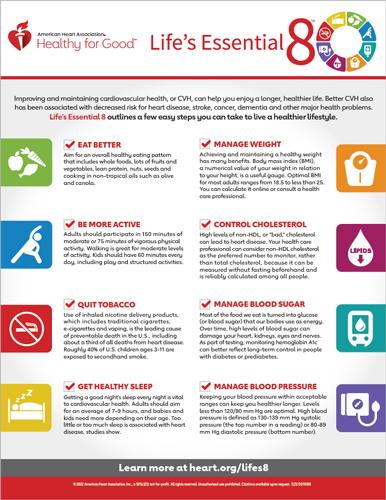Hoja de datos de Los 8 pasos esenciales para mi salud™
Los 8 pasos esenciales para mi salud
Mejorar o mantener la salud cardiovascular, o SCV, puede ayudarte a que disfrutes de una vida más larga y sana. Una mejor SCV también se ha relacionado con un menor riesgo de sufrir enfermedades cardíacas, ataques o derrames cerebrales, cáncer, demencia y otros problemas de salud importantes.
Los 8 pasos esenciales para mi salud describe algunos pasos sencillos que puedes seguir para llevar un estilo de vida más saludable.
- Come mejor: busca un patrón general de alimentación saludable que incluya alimentos integrales, muchas frutas y verduras, proteínas magras, frutos secos, semillas y cocina con aceites no tropicales, como el de oliva y el de canola.
- Aumenta tu nivel de actividad: los adultos deben participar en actividades físicas de intensidad moderada durante 150 minutos o de intensidad vigorosa durante 75 minutos. Caminar es una actividad física de intensidad moderada ideal. Los niños deben tener 60 minutos todos los días, incluidos los juegos y las actividades estructuradas.
- Deja el tabaco: el consumo de productos de inhalación de nicotina, que incluye los cigarrillos tradicionales, los cigarrillos electrónicos y el vapeo, es la principal causa de muerte evitable en los EE. UU., incluye casi un tercio de todas las muertes por enfermedades cardíacas. En EE. UU., aproximadamente el 40% de los niños de entre 3 y 11 años están expuestos a humo indirecto.
- Duerme lo suficiente: dormir bien todas las noches es fundamental para la salud cardiovascular. Los adultos deben tener como objetivo un promedio de 7 a 9 horas, y los bebés y niños necesitan más según su edad. Los estudios indican que el sueño excesivo o insuficiente está asociado con enfermedades cardíacas.
- Controla tu peso: alcanzar y mantener un peso saludable tiene muchos beneficios. El índice de masa corporal (IMC), un valor numérico de tu peso en relación con tu estatura, es un indicador útil. Un IMC óptimo para la mayoría de los adultos varía desde 18.5 hasta menos de 25. Puedes calcularlo en línea o consultar a un profesional de la salud.
- Controla tu colesterol: los niveles altos de colesterol no HDL o “malo” pueden provocar enfermedades cardíacas. Tu profesional de la salud puede considerar el colesterol no HDL como el número preferido que monitorear, en lugar del colesterol total, ya que se puede medir sin ayuno de antemano y se calcula de manera confiable entre todas las personas.
- Controla la glucemia: la mayoría de los alimentos que comemos se convierten en glucosa (o azúcar en la sangre) que el organismo utiliza como energía. Con el tiempo, los niveles elevados de glucemia pueden dañar el corazón, los riñones, los ojos y los nervios. Como parte de las pruebas, el monitoreo de la hemoglobina A1c puede reflejar mejor el control a largo plazo en personas con diabetes o prediabetes.
- Controla la presión arterial: mantener la presión arterial dentro de los rangos aceptables puede mantenerte más saludable durante más tiempo. Los niveles inferiores a 120/80 mm Hg son óptimos. La presión arterial alta se define como una presión sistólica de 130 a 139 mm Hg (el número superior en una lectura) o una presión diastólica de 80 a 89 mm Hg (número inferior).
Obtén más información en heart.org/lifes8
© 2022 American Heart Association, Inc., una organización 501(c)(3) sin fines de lucro. Todos los derechos reservados. Se prohíbe el uso no autorizado. Citas disponibles a solicitud.
Ver o descargar la hoja de datos
Inglés (PDF) | Español (PDF)

Ver o descargar la hoja de datos
Inglés (PDF) | Español (PDF)
Hojas de datos de Los 8 pasos esenciales para mi salud
- Los 8 Pasos Esenciales Para Mi Salud: hoja de datos Cómo comer mejor
- Los 8 pasos esenciales para mi salud: hoja de datos Cómo hacer más actividad
- Los 8 Pasos Esenciales Para Mi Salud: hoja de datos Cómo dejar el tabaco y los productos con nicotina
- Los 8 pasos esenciales para mi salud: hoja de datos Cómo lograr un sueño saludable
- Los 8 Pasos Esenciales Para Mi Salud: hoja de datos Cómo mantener un peso saludable
- Los 8 pasos esenciales para mi salud: hoja de datos Cómo controlar el colesterol
- Los 8 Pasos Esenciales Para Mi Salud: hoja de datos Cómo controlar la glucemia
- Life’s Essential 8 - How to Manage Blood Pressure Fact Sheet
- Hoja de datos Los 8 Pasos Esenciales Para Mi Salud